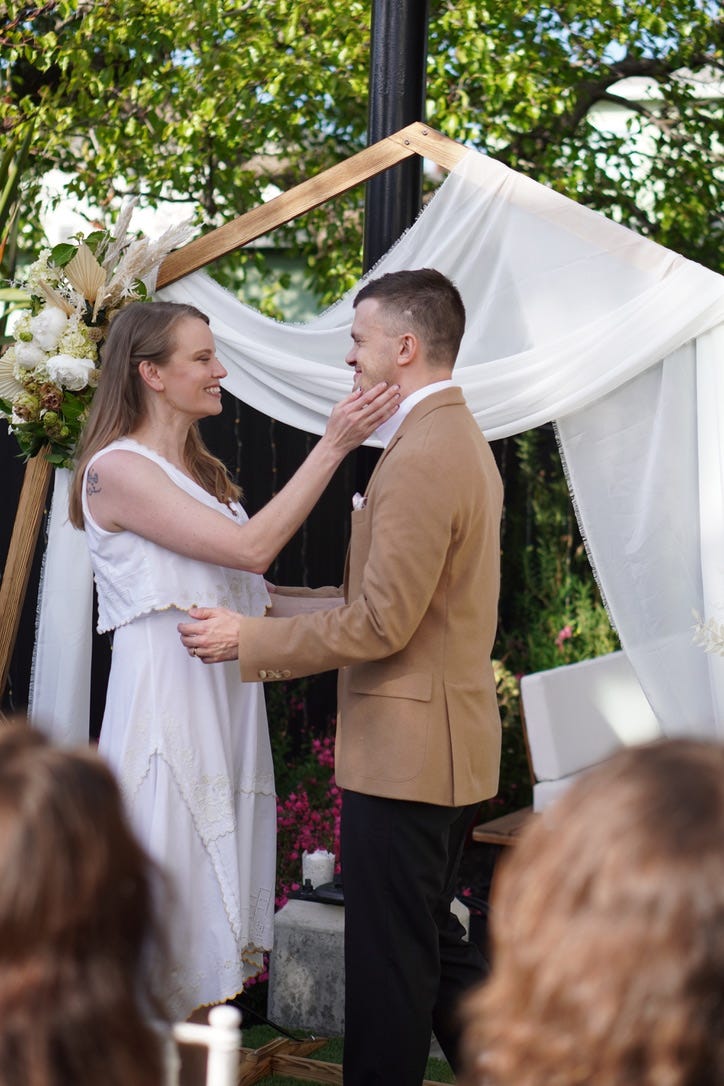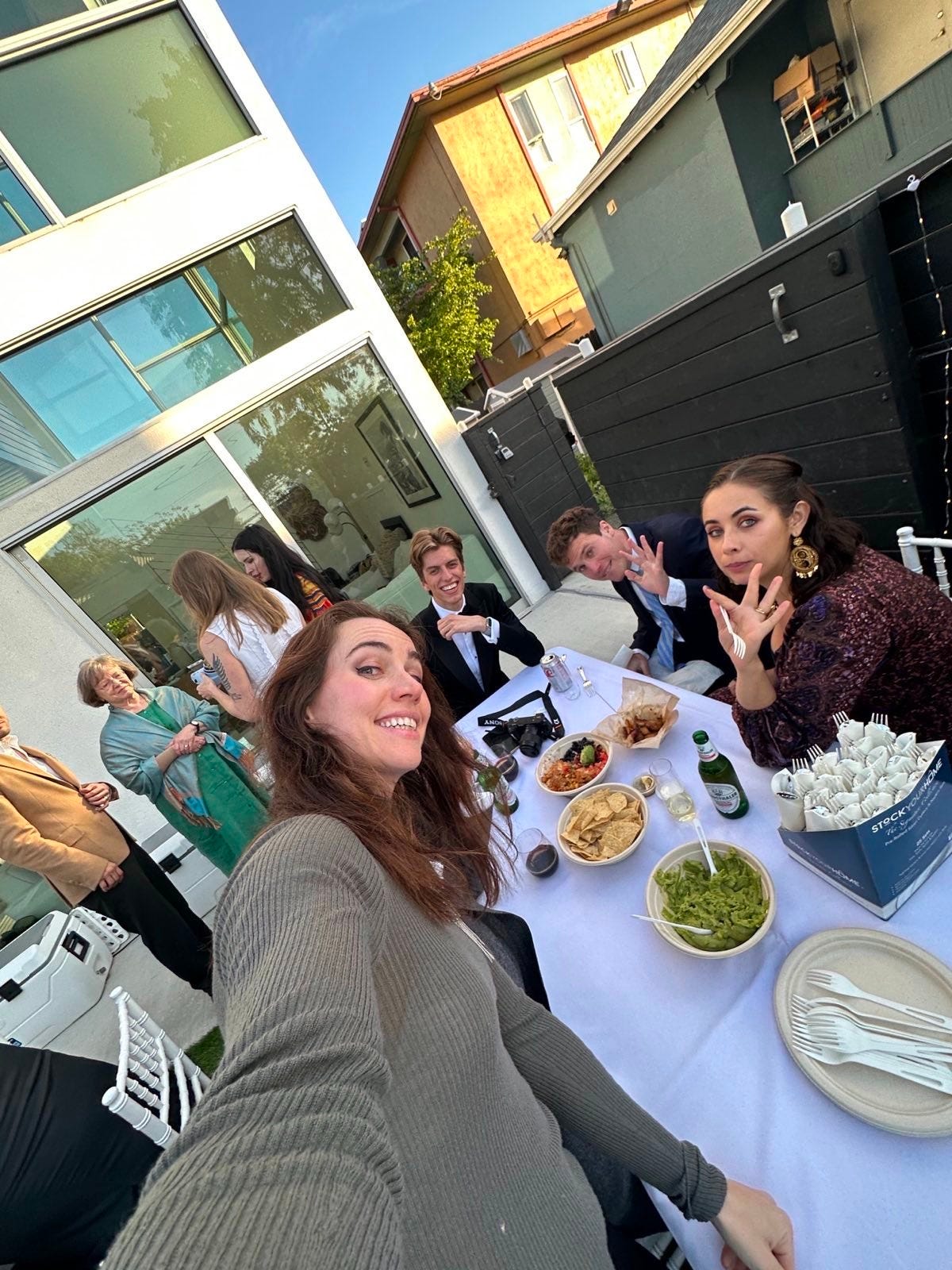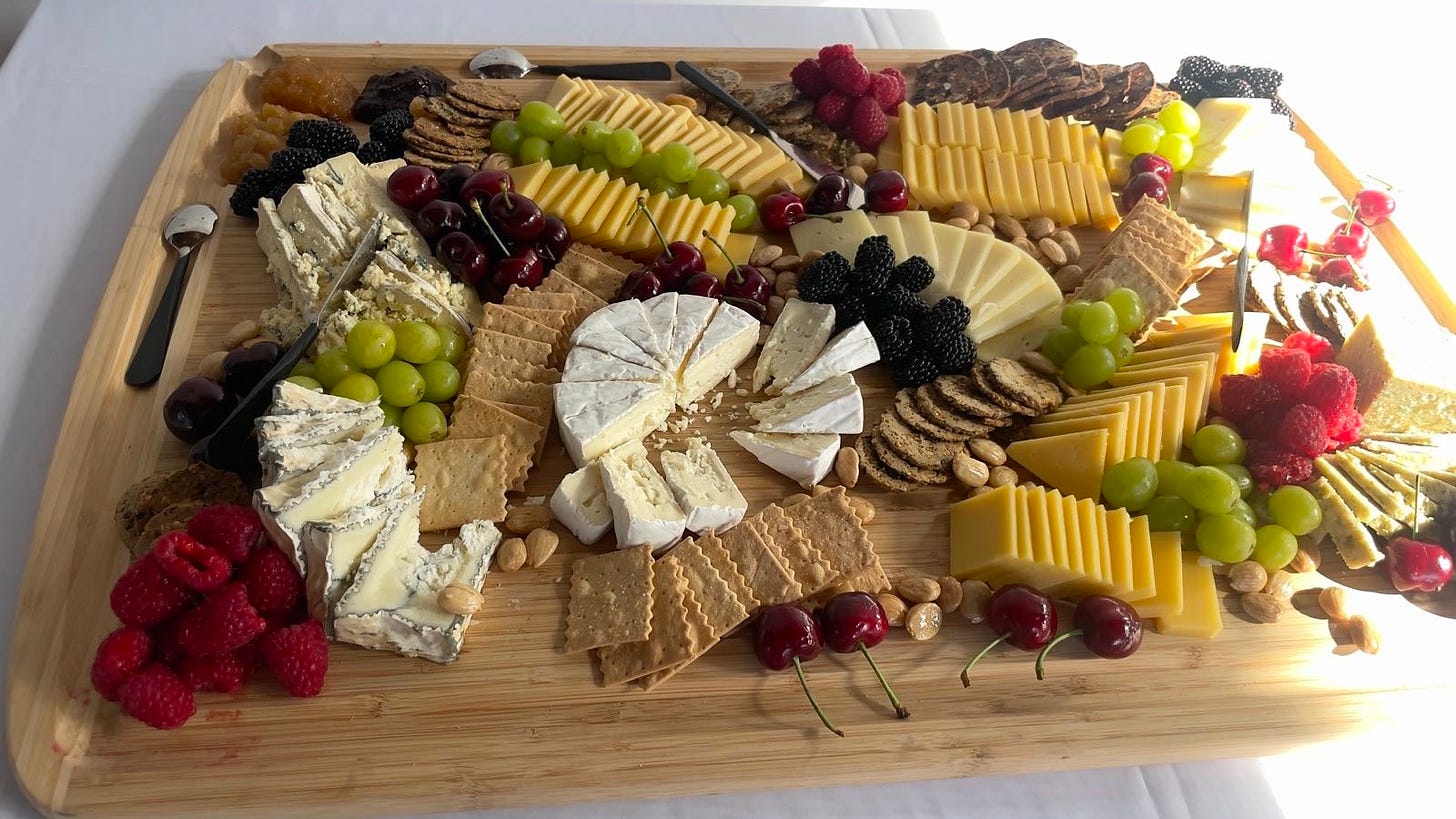This post was written with Cate Hall.
Everyone told us that our wedding would be stressful. It wasn’t—it was, in fact, an extremely fun, low-stress affair that left us feeling more connected and more excited to be newlyweds, rather than comatose with post-wedding exhaustion and pre-wedding conflicts. The hardest part was picking out a sports coat that was unusual enough to satisfy Sasha while not being too silly for Cate.
In total, we spent something like $7k on the wedding, but could have easily done it for under $5k. We spent under 20 hours planning it, about 1/4 of which was Cate obsessing over flower arrangements, because she loves flowers. We spent less time planning it than we did on a singles party we’d hosted a few months earlier.
Perhaps you, too, would like to have an unstressful wedding. Here is how we did ours. Some of these ideas could reduce your future nuptial cortisol.
No sweating the venue
We spent about 10 minutes researching venues before we were like, fuck it, let’s do it in the backyard. This was one of the best decisions we made. If you have a nice venue, you need nice decorations and nice catering and nice … other stuff weddings have. This is how you end up with “theme colors” for a wedding. If you do it in the backyard, it is cute and homey and everyone understands you aren’t trying to win the Best Wedding competition. Our decor consisted of a few string lights roped around our fence and, at the insistence of our officiant, a big ceremonial hoop that we bought on Amazon. We assigned early arrivers at the ceremony to adorn it with flower and chiffon. Two months later, it’s still up in our backyard—there’s no lesson here, we’re just lazy.
A short guest list
Having a backyard wedding forced us to keep it small, which we appreciated the excuse to do. We ended up with about 25 people at the wedding—no extended family, no work colleagues, no old roommates. When you are planning a wedding, people like to tell you that the wedding isn’t for you, it’s for your family and a bunch of other people. This is bullshit and you should not listen to them. Your wedding, at least assuming you are paying for it, is for you. Embracing this truth is, incidentally, one of the keys to having a stress-free wedding.
This did lead to a few awkward conversations with people who thought they’d be invited but weren’t—but as far as we know no one was terribly hurt to not be on the list.
A food truck and booze from Costco
You can hire food trucks to do private events; we got this bad boy for what worked out to about $50/head. People loved it, because they could order whatever they wanted off the menu, whenever they wanted throughout the night. The food was less stuffy and much better than most wedding food (dry chicken breast with Halfhearted Europe Sauce).
We were a little worried that this would result in people being too scattered, with nobody eating together. But this didn’t happen—we set up a few long tables, and people clumped dynamically, both hanging out with their friends and mingling with new people, which was totally perfect. Someone had the genius idea to order appetizers for each table, which helped—people flocked to the guacamole and then naturally ended up dining in groups.
Costco sells very nice sparkling wine at a reasonable price, including capital-C champagne. If you need nicer wine than Costco sells, you are allowed to do that.
No proper wedding cake
This one is sure to be controversial, but hey, our wedding was for us. Rather than order a fancy wedding cake, we went to Whole Foods the morning of and bought something like 7 different full cakes and pies. It cost ~$200 total and nearly everyone at the wedding had a dessert they loved. It honestly felt like one of the most extravagant and fun aspects of the reception, and was trivially easy compared to the standard.
Delegate jobs to people who want them
Or people who don’t want them. It is your wedding day, people are not allowed to say no to you and they feel a lot of social pressure to do things well. Milk this. In seriousness, people are happy to set stuff up and break it down and generally participate in bringing the party together—it makes for a more intimate affair overall.
We have a friend who has a fetish for carefully-arranged food and feeding people. Whenever we stay with him, he tries to feed us four meals a day, and many are nice. We gave him the cheese board as a job. He stood over it for an hour, moving with the grace and delicacy of a Tai Chi master. In the end, it was a quite fucking good cheese board.
We tapped another friend to be our wedding photographer. This only works if you either have a friend who’s good at and enjoys photography (our situation) or if you aren’t terribly concerned with how the photos come out (also our situation). We also bought a couple Polaroid cameras & left packs of film lying around—everyone looks good in a Polaroid and no one is sweating whether an unflattering pic will get posted online.
Also, Cate got her PA to be an extra set of hands, and this took things from “low stress” to “no stress”. She had light work for most of the day, and was probably not strictly necessary, but it was really nice to not have to sweat tidying up. There was almost nothing to do the next morning after we crashed.
Do speeches late, if at all, and make them non-obligatory
Even among eloquent people we know, perhaps 10% of wedding speeches are memorable. Wedding guests and the newly betrothed are generally too verklempt or polite to speak well. So we kept the ceremony itself super brief, and, while we didn’t explicitly forbid speeches, they were not encouraged.
Instead, later on in the evening, when the lights were low, everyone was relaxed, and those who were tired had left, a circle of our friends briefly made remarks about us, whether rambling and digressive or short and sweet, depending on individual temperament. This was incredibly pleasant, without the obligatory feel of a speech-fest.
Don’t make the wedding absolutely everything
In the end, it was a singularly lovely occasion that exceeded our expectations. This was made more likely by the fact that we didn’t try too hard. Partially, that was temperamental: neither of us is big on ceremony, so it didn’t feel very stakes-y. If the wedding wasn’t spectacular, we wouldn’t have considered it a huge tragedy. This made it easier to make intuitive decisions without fretting. It also made it easier to—and we’re belaboring this point here because we think it’s important—do things that we liked, rather than things we thought others expected of us.
Generally, we think that insisting on a magical wedding will probably ruin the fun of it and is, anyway, a misunderstanding of what’s important in the relationship. It is one good day. But a marriage, hopefully, will have lots of days, magical and otherwise. In the end, our wedding looked like we want our relationship to look: full of love and spontaneity, not anxiety and solemnity.









I love this and I love that you did exactly what you wanted and kept it small. I just wrote an essay about how I did the exact opposite. But the conclusion I drew (basically "you have permission to do what you feel like for your wedding and you should because it's for you and it's special") tracks with this. Marriage is super dope. More dope people should write about how great it is.
I very much believe in “many different cakes,” this should be the norm!